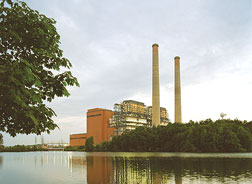Electric utilities, construction interests and environmental groups have Nov. 1 circled on their calendars. That is the day the U.S. Supreme Court will hear oral arguments in a case focused on whether upgrades to aging coal-fired powerplants violated the Clean Air Act.
 Duke Energy Duke Energy projects at issue. |
At issue in the case, Environmental Defense v. Duke Energy Corp., is whether the Environmental Protection Agency properly interpreted the clean air law's "new source review" rules in 1999 when it found that 29 projects at eight Duke Energy generating units resulted in higher annual emissions at the sites.
The petitioners want the high court to determine whether an appellate court overstepped its jurisdiction in instructing EPA to determine NSR violations based on increased hourly emissions and whether EPA enforcement of NSR at existing sources based on "actual, annual emission" increases is allowed.
Steve Lomax, air-quality programs manager at the Edison Electric Institute, a utility group, says the case shows the lack of clarity surrounding NSR enforcement. "Hopefully, the Supreme Court will be fairly prescriptive in what they determine EPA will be allowed to do," he says. "There's no guarantee on that. Really, it could shake out in many ways."
Duke Energy and other utilities EPA sued during the Clinton administration argue that the work was routine maintenance and equipment replacement and thus does not trigger NSR-required pre-construction permits and installation of best available pollution control equipment.
| Court is asked to determine when renovations at coal-fired plants trigger new-source review requirements. |
But EPA and environmental groups claim the renovations that kept aging units on line past their expected operational life were "modifications," which warrant NSR mandates.
EEI, American Electric Power, Southern Co. and the Utility Air Regulatory Group, told the court that because NSR requirements must be met before construction and can take years to fulfill, "critical energy facilities would either be shut down or in a state of perpetual permitting if petitioners had their way."
In a separate brief, the boilermakers' union and Electric Reliability Coordinating Council, a utility industry group, suggest that a ruling against Duke Energy could harm construction workers.
But John Walke, Natural Resource Defense Council clean air director, says utility interests have "never demonstrated that NSR [enforcement] contributes to safety hazards at industrial facilities for boilermakers or anyone else."
If plaintiffs win, Walke says utilities facing possible NSR violations may be driven to install scrubbers and selective catalytic reduction technology, as Tampa Electric and Dominion Power agreed to do under settlements with EPA.



Post a comment to this article
Report Abusive Comment